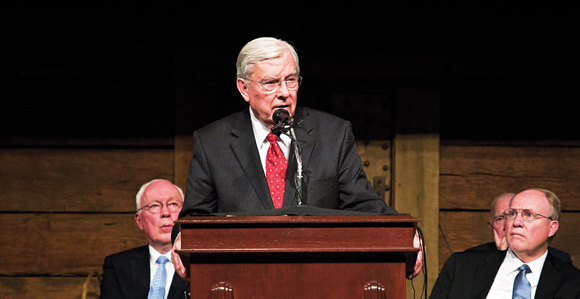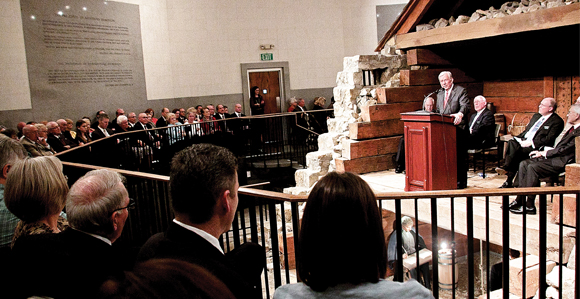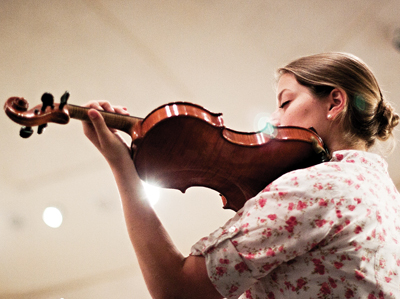Elder Ballard Speaks at Anniversary of Historic Liberty Jail
Contributed By By R. Scott Lloyd, Church News staff writer, and Sharon Shull, Church News contributor

The audience at a reception commemorating 50 years since the dedication by Elder Joseph Fielding Smith of the Historic Liberty Jail Visitors’ Center listens as Elder M. Russell Ballard speaks from a pulpit in the cut-away reconstruction of the jail.
Article Highlights
- At the event Elder M. Russell Ballard and Church history scholars spoke on the history surrounding Joseph’s imprisonment in Liberty Jail.
- Joseph and five Church leaders were confined for 4½ months in the 14x14-foot jail during a bitterly cold winter.
- Elder Ballard explained that Joseph’s sufferings in the jail taught Joseph more deeply about the Atonement of Jesus Christ.
“Joseph was only 38 when he was betrayed again into a jail unjustly. But Joseph said, ‘No unhallowed hand can stop the work.’” —Elder M. Russell Ballard of the Quorum of the Twelve
Related Links
LIBERTY, MISSOURI
It has been half a century since the historic Liberty Jail was dedicated by Elder Joseph Fielding Smith, then a member of the Quorum of the Twelve. This monument site is where the imprisoned Prophet Joseph Smith in 1839 received the revelations now recorded as Doctrine and Covenants 121–23.
The 50th anniversary of the dedication was celebrated the weekend of October 12–13 with a Sunday reception featuring addresses by Elder M. Russell Ballard of the Quorum of the Twelve and other Church leaders, a Saturday symposium featuring three scholars from Brigham Young University, and a reader’s theater telling some of the history and events that occurred during the winter of 1838–39.
Liberty Jail, the vile dungeon where the Prophet was confined with five companions for four and a half months that winter, evokes reverence in the minds of the Latter-day Saints. Elder B. H. Roberts called it a “prison-temple” (see A Comprehensive History of the Church, 1:521) because of the sublime revelations that were given there.
At the dedication of the visitors’ center on September 15, 1963, Elder Smith said of the jail, “It is the place where the Prophet Joseph Smith and my grandfather, Hyrum Smith; Sidney Rigdon; Caleb Baldwin; Alexander McRae; [and Lyman Wight] … were incarcerated for the sake of the gospel of Jesus Christ.
“It was in that building, jail, under the hard sufferings that they went through, that the Prophet, in the spirit of humility, knelt before the Lord and prayed and asked the Lord how long this suffering would have to go on, and the Lord answered him. …
“The Lord told the Prophet Joseph Smith that He too had suffered, and nobody ever suffered more than the Son of God” (in Church News, Sept. 21, 1963, 14).
Fifty years later, Elder Ballard echoed those sentiments as he spoke October 13 from a pulpit in the cut-away reconstruction of the jail inside the rotunda of the visitors’ center.
Addressing himself to those in attendance not of the LDS faith, he explained who the Prophet Joseph Smith is “and why he is so important to us.”
“It was a miserable 4½ months here in the winter,” Elder Ballard said, regarding the experience of the Prophet and his companions in Liberty Jail. “But they learned something about suffering that drew them close to the very precious. They learned of the Atonement of Jesus Christ. They learned to understand more about the words uttered by Christ in Gethsemane and on the cross. Heaven was very close to these men as they passed through the sufferings that happened here.”

The audience at a reception commemorating 50 years since the dedication by Elder Joseph Fielding Smith of the Historic Liberty Jail Visitors’ Center listens as Elder M. Russell Ballard speaks from a pulpit in the cut-away reconstruction of the jail. Photo by Lori Garcia.
Speaking of the martyrdom at Carthage, Illinois, Elder Ballard said, “Joseph was only 38 when he was betrayed again into a jail unjustly. But Joseph said, ‘No unhallowed hand can stop the work.’
“Today, 80,000 young men, young women, and senior couples are serving all over the world. They are declaring that the gospel of Jesus Christ has been restored. God loves His children today. He has given us prophets.”
Elder Robert C. Gay of the Seventy spoke of the treachery of Colonel George M. Hinkle, who betrayed Joseph Smith and other Church leaders into the hands of the Missouri militia and contrasted that with the conduct of Alexander Doniphan, a militia officer who defied an illegal order to execute Joseph Smith and his companions. The lesson from Liberty, Elder Gay said, is to stand for and be true to the right.
Also speaking at the reception were Karl Ricks Anderson, a historian from the Kirtland, Ohio, area, who had been with Elder Ballard earlier in the day for commemorative events at that historic site, and President Donald Keyes of the Missouri Independence Mission.
Among scholars giving presentations on Saturday at Liberty Jail was Alexander Baugh, professor of Church history and doctrine at BYU and a specialist on the Missouri period of Church history. He gave three presentations.
He spoke of Liberty Jail as “a lonesome prison.” He described events that led to the Prophet and his companions, through treachery, being turned over to a Missouri militia and eventually being imprisoned in the jail.

Sister Sophie Wilson, a missionary at the Independence Visitors’ Center from Bellevue, Washington, plays “A Poor Wayfaring Man of Grief” on the violin for the Liberty Jail commemoration. Photo by Lori Garcia.
The jail was about 14 feet by 14 feet, he said, and the lower dungeon had a ceiling about 6½ feet high, the height of Alexander McCrae, one of the prisoners. The walls were 4 feet thick with loose rock in the middle of the wall. There was also loose rock above the ceiling on the upper floor. There were two small windows with iron bars on the upper level and even smaller windows in the dungeon.
The prisoners’ food was coarse, dirty, and lacked variety, Brother Baugh said. “Occasionally visitors would bring them food and clean clothing, which was greatly appreciated. Blankets and winter clothing were also appreciated, as there was no heat in the jail.” Family visits were allowed; as babies, Joseph F. Smith and Joseph Smith III were likely blessed by their fathers in the jail, Brother Baugh said.
What is now recorded as Doctrine and Covenants 121–23 was part of a letter sent by the Prophet to his wife, Emma, in a letter dated March 20, 1839, Brother Baugh said. Those sections express Joseph’s distress at the conditions he and his friends were in, as well as the concern and distress over Church members and “the great love of the Lord for each of us.”
“Liberty Jail changed Joseph,” Brother Baugh said. “He became more compassionate, more kind, and more determined to do what the Lord asked.”
In a March 20, 1839, letter to Edward Partridge, Joseph said the Liberty Jail experience was a trial “equal to that of Abraham.”
In a later presentation, Brother Baugh said Liberty Jail was used as a county jail until 1858, when it was replaced. The property was vacant and the building was used as an icehouse for several years. It was bought by Leroy Stephens in 1904, who tore down the remains of the upper floor and built a house using the existing foundation as part of the foundation of the house. The house was sold to Carl Fisher in 1920.
Wilford C. Wood of Woods Cross, Utah, bought the house on June 19, 1939, for $400 and gave it to the Church. President Heber J. Grant then paid Brother Wood for the house.
For 10 years, there was no development, so in 1949 Brother Wood purchased the house next door as a residence for a missionary couple to give tours; from 1949 to 1958 missionaries lived in the house and gave tours. It was also used as a meetinghouse for the Liberty Branch.
The current visitors’ center was constructed in 1962–63.
Susan Easton Black, BYU professor of Church history and doctrine, spoke of Alexander W. Doniphan, the Missouri militia officer who defended Joseph Smith and other Church leaders from illegal execution in events leading up to their imprisonment at Liberty.
She quoted his well-known written defiance of Major General Samuel D. Lucas’s order to shoot Joseph and the other prisoners on the public square at Far West. But she also quoted his private statement to Lucas: “You hurt one of these men if you dare and I will hold you personally responsible for it, and at some other time you and I will meet again when in mortal combat and we will see who is the better man.”
Daniel C. Peterson, BYU professor of Islamic studies and a frequent speaker on and defender of Mormonism, spoke on the topic “Suffering, Lies, and Injustice: Lessons from Liberty,” drawing thoughts from Doctrine and Covenants 121–23.
“We all go through trials of greater or lesser degree,” he said, “from defeats, losses, bereavement, betrayal at the hands of people we thought friends. And the Lord promises us ultimate triumph. But it comes on His timetable, not ours. And to Him a day is as a thousand years. So, yes, Joseph was promised that his adversity and his affliction would be but for a small moment and that he would then be exalted above all his foes, but it actually lasted for more than five additional years, and, in a very real sense, his triumph came only after his death.”
Brother Peterson expanded upon the Lord’s statement that “the Son of Man hath descended below them all,” and the question “Art thou greater than he?” (D&C 122:8). Brother Peterson said that the unique heart of Christianity is that God is not a distant “unmoved mover” but that He understands mortal trials, having shared them all.
